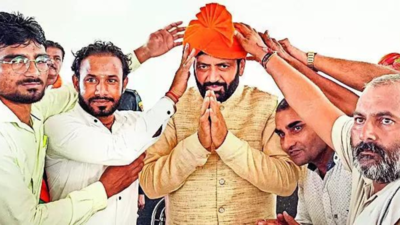[ad_1]

Humne ke bera, humare khatir koi kade kuch na karta (What do we know? Nobody does anything for us ever). There are no jobs, no business opportunities for us. We work on other people’s farms,” says Manju Devi, who belongs to the Khati (OBC) caste. “My 24-year-old son is unable to get a job even after earning a degree.”
Asked if she will cast her vote if there’s no hope from any political parties, the resident of Dabla village, Sirsa, says: “Ib ghar beth ke bhi ke kara (What will I do sitting at home [on polling day)?”
Many from the lower castes share the sense of disillusionment.”We are living in our own homes like tenants. We are paying for all amenities, getting nothing from the govt,” says Promila, a cleaner in Rohtak belonging to the Scheduled Caste community.
She shows little enthusiasm for the elections. “I do not feel like voting. Neither Modi nor Rahul Gandhi cares about uplifting us,” she says. Despite this, she admits, “I’ve always voted for BJP.”
“It is usually my brother-in-law who tells me who to vote for,” adds the 42-year-old widow who like many women in the state, notorious for its patriarchal values, depends on male family members to decide her vote.
Another OBC voter Sooraj Prakash, 38, a resident of Shahidanwali village in Sirsa, says: “We want change. Our MLA (Gopal Kanda) hasn’t done anything for us. We face massive water-related issues. There has been no growth in the rural areas. Farming-related issues continue to trouble us.”
These voices from Haryana’s Dalit and OBC communities reflect a broader sentiment of disempowerment. While they may feel their votes don’t matter, their choices are crucial. With Jat voters leaning towards Congress, and the Punjabi and Saini (OBC) communities largely favouring the BJP, those from the lower castes – Dalits and other marginalised OBCs – may hold the balance of power in deciding the state’s next govt.
According to experts, most Yadav votes in the state would go to BJP. Political analyst Satish Tyagi says OBC communities have been inclined to BJP for the last 10 years.
“The current CM being a Saini will get BJP a good chunk of votes from the Saini community & Congress is expected to get 40% OBC votes.”
“We are Yadavs. We are the Narayani Sena. But there’s no regiment for us, nothing,” a 30-year-old BJP supporter from Bhiwani laments, adding: “Are only jats farmers in this country? We need leaders who bring talented people forward and work bias-free.”
His bias issue represents an anti-Jat sentiment owing to the former regimes with a reputation of favouring the Jat community in govt jobs. “In Lok Sabha elections, Dalit and Jat votes consolidated with Congress. The same pattern is running in Vidhan Sabha too,” Rohtak-based journalist Virender Phogat told TOI.
Noting Rahul’s “36 biradari ki Congress sarkar” slogan, Phogat says his ‘Save Constitution’ drive and anti-incumbency “will be a game changer for the Congress party”.
Haryana has 40.9 lakh SCs comprising 19.4% of the state population – fifth largest in India. Will Congress’ promise to conduct a caste-based survey in the state have a major impact? “It is perceived that only chamars have benefitted to a large extent from reservation. A caste census would redefine share of other castes. The deprived SCs see that as hope…”
“Brahmins, Punjabis & Sainis traditionally support BJP. But few things are above caste lines like the farmers’ stir. (As per the last census) Nearly 62% of Haryana is rural – directly or indirectly associated with farming industry comprising people of all castes.”
[ad_2]
Source link


